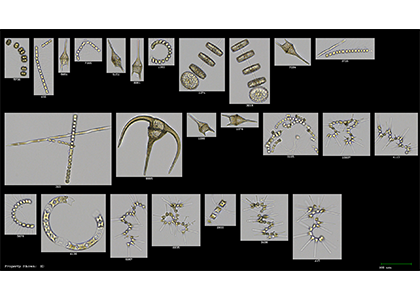Participate in a working group to develop standards and best practices for the collection and assessment of Operational Phytoplankton Observations (OPO) using particle imaging instruments (PII). As PII technology has matured in recent years, it is becoming a more routine sampling component of ocean observing programs and networks (e.g., Bio-GO-SHIP). We are looking to gather a broad range of subject matter experts that include phytoplankton image data producers, image and data analysts, and data users to form the core membership of the OPO Working Group.
The goal of this activity is to develop a set of standards and best practices for both the collection and downstream processing of phytoplankton images produced by PIIs. These best practices will result in consistent, quantitative observations of phytoplankton taxonomy and biomass.
The OPO Working Group will identify challenges associated with quantitative sampling of phytoplankton due to:
1) Different oceanic provinces and biomass levels (e.g., coastal, open ocean)
2) Aquatic sampling techniques (e.g., bottle, underway), profiling or towed technologies, ocean observatories (moorings)
3) Operational differences between current phytoplankton imaging instruments (PIIs) and analysis tools.
The OPO Working Group will develop recommendations for specific instruments and sampling techniques to ensure that phytoplankton measurements are consistent, robust, and quantitative. These guidelines will be published as a peer-reviewed paper for distribution to the broader community, and our goal will be to seek endorsement from the Global Ocean Observing System (GOOS) for the best practices recommendations that emerge from this activity. Additionally, the best practices recommendations will be archived as a document in the Ocean Best Practices System repository.
We will convene two in-person working group meetings August 2-4, 2023, and early 2024, along with asynchronous online activities in preparation for the in-person meetings. OPO Working Group members will also participate in regular synchronous virtual meetings occurring between the in-person meetings. Our intention is to create a working group that is inclusive of participants from all backgrounds and a range of career stages.
More detailed information about planned working group activities and the application form to participate in the working group are now available here. Apply by March 27th, 2023.
Application form can be accessed here.
For those who are interested in this activity and its outcomes but who are not able to commit the time to participate in this working group, we will continue to provide updates to the full community about working group progress and products, including at the in-person meeting associated with the 2024 Ocean Science meeting, and the 2024 OCB summer workshop.





